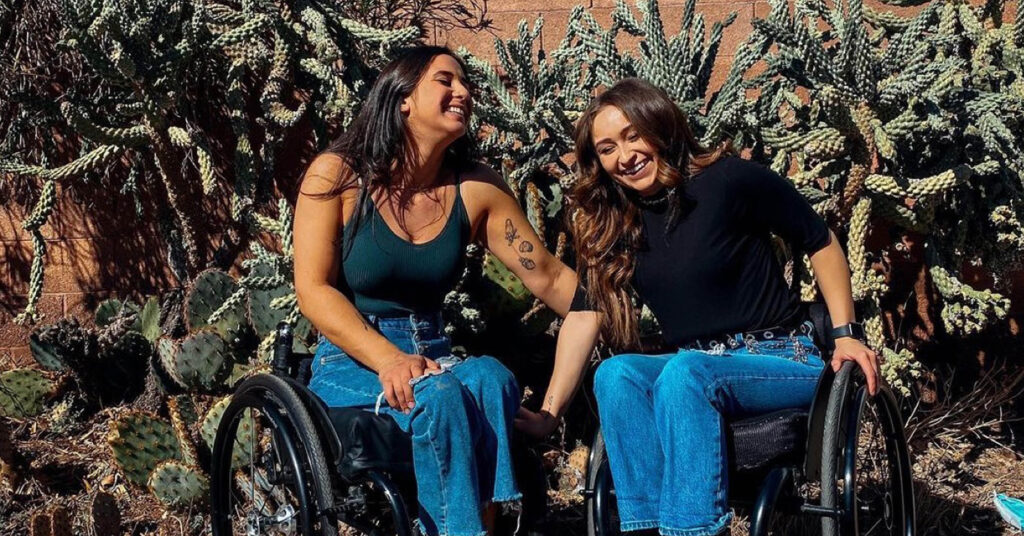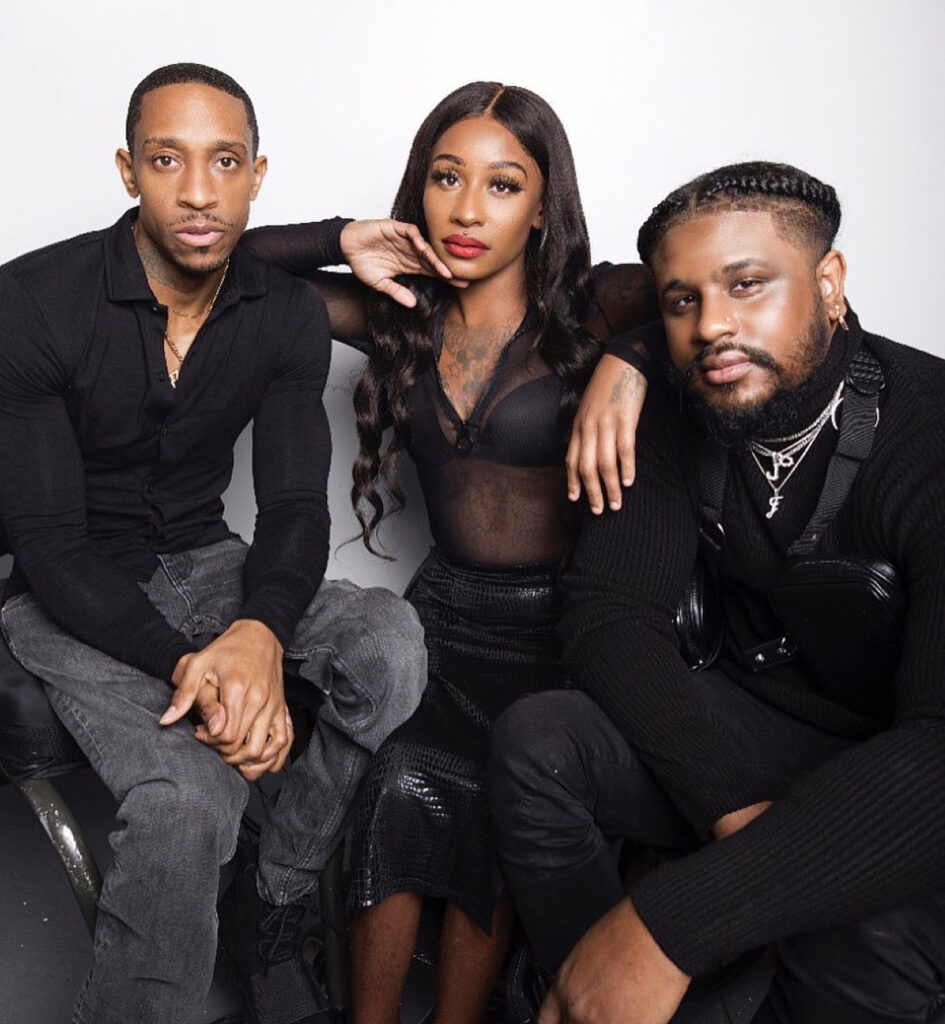Starting a podcast can be rewarding and fun. Podcasts allow wheelchair users to share their perspectives and quash the stigmas around disability. They can be straightforward and inexpensive to produce, and with a good microphone and simple setup, they can be recorded almost anywhere. They also have the potential to reach a lot of people and make a positive impact. The creators of three disability-centric podcasts — Sit the F*ck Down, From the Throne, and Disability After Dark — share how they got started, what they’ve learned and what keeps them going.

Sit the F*ck Down
How it started: In October of 2020, Christina Chambers and Liv Bender lived less than a mile down the street from each other in Phoenix, Arizona. Both have transverse myelitis, a rare inflammatory disease that injures the spinal cord, and as the COVID-19 pandemic raged, they decided to quarantine together. “We were drunk talking one day and had a heart-to-heart moment where we said we were so lucky to have each other,” says Chambers. “As women, we can talk to each other, share our stories, and be open and candid about what it is to be a disabled woman in today’s world.” They knew there was a community of female wheelchair users on social media who might also benefit from these conversations.
Thus, Sit the F*ck Down was born — a show where they discuss topics like dating, sex, travel, mental health and disability representation. They also have guests — like U.S. Paralympian Kaitlyn Verfuerth and Grammy award-winning guitarist Eric Howk. They even spoke with a disability devotee. “We just want it to be candid, and like every other conversation we’ve ever had,” says Chambers.
Behind the podcast: “We almost didn’t release our first episode because it wasn’t perfect, but we knew that they would get better over time,” says Chambers. She and Bender researched “how to make a podcast” online and watched YouTube videos. “We split up the tasks,” says Chambers. “I became the social media person, and since Liv is more analytical and is an audiologist, she handled the sound and uploading.” To make Sit the F*ck Down sound more professional, Chambers and Bender built a studio in the spare bedroom of Chambers’ apartment. “We bought microphones and super cheap soundproofing stuff on Amazon. We put a rug down, got some couches and filled the room with fluffy things,” says Chambers.
Why they do it: Chambers was surprised to get thank-you messages from nondisabled people who appreciate how educational and insightful their show is. “This is our way of giving back to our community because we felt so underrepresented in the media and news outlets, and just in conversations that happen every single day,” says Chambers. “This is our way of being brought to the table.”
Advice for aspiring podcasters: Chambers says to do your research and avoid overspending on equipment. “Do what you’re passionate about, release the first one, and it will get better, and you’ll get more confident in your podcasting abilities as time goes on,” she says.
Where to listen: Sit the F*ck Down is available on Apple Podcasts and Spotify.
From the Throne

How it started: In From the Throne, Jessie Chin, Francesca “Frenchy Minaj” Kellise, and Antwan Tolliver share their perspectives on topics like dating, sex, parenthood, race and health. The three New York City friends are wheelchair users due to spinal cord injuries and share a passion for good conversation and educating others about disability. “People with disabilities are not represented in a positive way,” says Chin. “So, we wanted to showcase that. Just because you have a disability, that doesn’t mean life doesn’t go on. You can still have a productive life.”
Episodes often feature a guest with a different disability, and the crew allows the conversations to roll wherever the guest takes them. In episode 7, they chat with the host of the podcast Blind But Now I See, who goes by the name “cnote,” about what it is like to be visually impaired. “Our show is for people with disabilities, but it is also for everyone,” says Chin. “It’s all about bridging that gap. If we really want to make change, we have to talk to people that are nondisabled too. We have to find a common ground.”
Behind the podcast: Chin, Kellise and Tolliver record From the Throne in New York City and have a video version of each episode on their YouTube channel. “A lot of the studios are not accessible because the buildings are old,” says Chin. “That was the trouble at first, trying to find the right one for us.”
Why they do it: “If the podcast ends tomorrow, I did my part by the number of people it’s helped and touched,” says Chin. “My purpose is to help people; I don’t need a dime out of it.”
Advice for aspiring podcasters: Chin encourages people to be their authentic selves. “It’s important to show individuality within the disability community,” he says.
Where to listen: From the Throne is available on Apple Podcasts, Spotify, and YouTube.
Disability After Dark

Photo by Alice Xue Photography
Andrew Gurza receives around $500 a month from his fans via Patreon.
How it started: Andrew Gurza has been recording Disability After Dark from his bedroom in Toronto, Canada, since 2016 and has released close to 400 episodes. For the first year of his podcast, Gurza, who has cerebral palsy, focused solely on disability and sex but then pivoted to telling a wider variety of disability stories. In one of his favorite episodes, number 65, he interviews his mom about what it was like raising him — a disabled son who also came out as queer in his teens. Gurza also does bonus episodes like Great Flix and Joysticks, where he reviews TV shows and movies about disability.
Recently, Gurza started a podcast network, Cripple and Co., to mentor people who want to create their own podcast. “I think there needs to be different voices in the disability space,” he says. “If I can use my platform to help others make a show that is disability-centric and is their voice, then I want to do that.” For those interested in working with Gurza, his email is disabilityafterdarkpod@gmail.com.
Behind the podcast: Gurza coordinates guest interviews, records, edits, uploads and promotes each episode. To help support his work, Gurza uses Patreon, a platform that lets people financially contribute to content creators. “I just said, if you like what I’m doing, throw me some dollars,” says Gurza. “It will help me do two things. It will help me survive as a disabled person making content. And I’m going to use the money to get a nice mic and a proper setup.” Gurza currently receives close to $500 a month from his supporters.
Why he does it: Listeners tell Gurza that the podcast makes them feel less alone. “To know that something I make in my bedroom is giving people something they are craving is still very mind-boggling to me,” says Gurza.
Advice for aspiring podcasters: “Don’t go into it looking for podcast fame. Just do it because it’s something you like to do and because you know the content you are making is important. Just have fun with it.”
Where to listen: Disability After Dark is available on Apple Podcasts, Spotify, Google Play and Stitcher.
Support New MobilityWait! Before you wander off to other parts of the internet, please consider supporting New Mobility. For more than three decades, New Mobility has published groundbreaking content for active wheelchair users. We share practical advice from wheelchair users across the country, review life-changing technology and demand equity in healthcare, travel and all facets of life. But none of this is cheap, easy or profitable. Your support helps us give wheelchair users the resources to build a fulfilling life. |


Recent Comments
Bill on LapStacker Relaunches Wheelchair Carrying System
Phillip Gossett on Functional Fitness: How To Make Your Transfers Easier
Kevin Hoy on TiLite Releases Its First Carbon Fiber Wheelchair